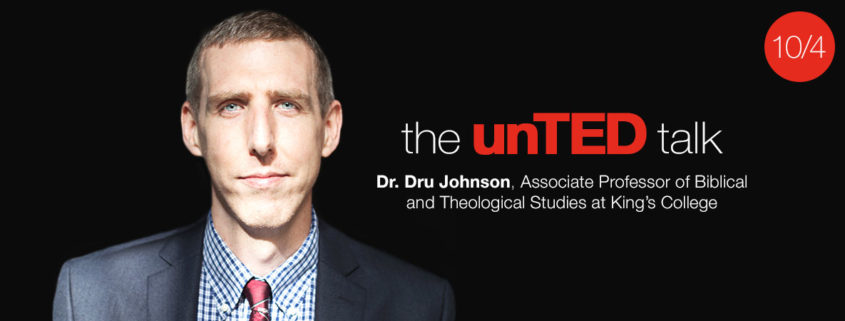The unTED Talk
Covenant is excited to have Dr. Dru Johnson from The King’s College speak to our community on Tuesday, October 4th at 7 PM. Dr. Johnson earned a Ph.D. from the University of St Andrews in Scotland, writing a thesis on biblical epistemology. Prior to serving as an Associate Professor of Biblical and Theological Studies at King’s, Dr. Johnson studied and taught analytic philosophy at the University of Missouri–St. Louis. He has earned an M.Div. from Covenant Theological Seminary and an M.A. in Philosophy from the University of Missouri.
Dr. Johnson has served as a Templeton Senior Research Fellow at The Herzl Institute in Jerusalem, Israel and serves as the co-chair for the Hebrew Bible and Philosophy program unit in the Society for Biblical Literature. Dr. Johnson also teaches occasionally as a visiting professor at Covenant Theological Seminary and more frequently in Western Kenya in a school for rural pastors. He formerly served seven years in the U.S. Air Force, including five years involved in counter-narcotics operations in the Amazon basin of Columbia. He is ordained in the Evangelical Presbyterian Church and he and his wife have four children.
His publications include:
- Biblical Knowing: A Scriptural Epistemology of Error (2013)
- Scripture’s Knowing: A Companion to Biblical Epistemology (2015)
- Genesis 1-11. Transformative Word Commentary Series (2016)
- Knowledge By Ritual: A Biblical Prolegomenon to Sacramental Theology (2016)
Drawing on his research in philosophy and theology, Dr. Johnson will be speaking about the kind of learning that leads to transformative growth and wisdom. Here is a description of his talk:
“The unTED Talk: How well-crafted speeches don’t necessarily teach us anything”
A college quite literally refers to a group of colleagues. Scientists have figured this out. The scientific enterprise only works when colleagues work in community to better understand the realities that they study. Learning, for scientists, necessarily happens as a form of apprenticeship within a community, where a young scientist begins as a novice and trains to contribute to the group’s understanding.
TED Talks, on the other hand, propose another model of learning: a profound and eloquent insight delivered in a polished and brief speech. These wildly popular talks focus on the expert in the room sharing what he or she has learned with everyone else. However, what do we learn in such an environment? The danger is both in the setup and delivery. A polished speech can leave us thinking we’ve understood something profound, but we only feel that way because we understood how the parts of the talk worked together toward a common rhetorical goal. TED Talks are famous for this and that “polished speech model” is even being mocked within the TED Talk community.
Thousands of years ago, the Hebrew Bible and New Testament spelled out a unique view of expertise formation. Under the biblical model, young folk do not learn by well-crafted talks—though eloquent oratory often engages us as learners. Wisdom attains by entering a community of learners, submitting to their authority, and embodying instruction in order to see the world differently than could ever happen otherwise. Thus, discernment is transformational, forever changing the way we see that which we study.
This talk challenges the “do what you love” idea of careerism by looking at these two forms of learning: the lure of listening to excellent rhetorical construction without transformation as opposed to submitting to a community that seeks to foster wisdom amongst colleagues. I pose that the “do what you love” model of career planning—so prevalent today—should be replaced with a better question: What community should I belong to and how will being a colleague transform my understanding?



